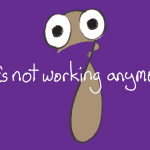I admit it–I am not always kind or politically correct on social media (especially Twitter). I have been known, for instance, to drop an f-bomb on someone who believes that the 2020 election was stolen or that Donald Trump will be reinstated to the Presidency this month. I get into even more trouble when sports are involved. I once said something less than complimentary on Twitter about a fellow sports fanatic, a person who made the mistake of talking trash about my Providence College Friars hockey team the morning after they were eliminated from the NCAA hockey tournament in double overtime. After finding out from my Twitter profile that I am a philosophy professor, he expressed great surprise and mock outrage that a professor would stoop to talking trash about sports, then accused me of being hypocrite.
on someone who believes that the 2020 election was stolen or that Donald Trump will be reinstated to the Presidency this month. I get into even more trouble when sports are involved. I once said something less than complimentary on Twitter about a fellow sports fanatic, a person who made the mistake of talking trash about my Providence College Friars hockey team the morning after they were eliminated from the NCAA hockey tournament in double overtime. After finding out from my Twitter profile that I am a philosophy professor, he expressed great surprise and mock outrage that a professor would stoop to talking trash about sports, then accused me of being hypocrite.
One of the headlines on the cover of a recent Atlantic Monthly was “Why It Pays to Be a Jerk,” a title I brought to Jeanne’s attention. “Yeah,” she mentioned, “and there’s also an article in there about you philosophers being immoral.” Thinking that this might be the article about being a jerk, I looked it up in the Table of Contents. But no—“Why It Pays to Be a Jerk” was one of the lead articles, while “Philosophers are Hypocrites (and ethicists are less than totally ethical)” got its own brief three-column spread under a monthly category entitled “Study of Studies.” As both a philosophy professor and an occasional jerk, I was intrigued. I discovered some interesting survey findings about philosophers and academics at large.
- Sixty percent of a couple hundred ethicists interviewed in one study rated eating red meat as “morally bad,” but only 27 percent said they didn’t regularly eat red meat. Not that I was surveyed, but I stopped eating red meat six or seven years ago. As soon as chickens and turkeys are reclassified as plants, I’ll be all set.
- Ethicists and political philosophers were no more likely to vote than other kinds of professors, nor were ethicists more likely to donate blood or register as organ donors. And your point is? Plato, one of the greatest political philosophers ever, claims that the more one knows, the less likely one is to willingly participate in the political process. And maybe the reluctant ethicists are Jehovah’s Witnesses.
- Compared with other philosophy texts, contemporary ethics books of the sort likely to be borrowed mainly by professors and advanced students of philosophy were roughly 50 percent more likely to be permanently missing. Lots of assumptions here. I presume that some of the “contemporary ethics books” under discussion are the sorts of anthologies that applied ethics professors such as I use in their undergraduate courses, anthologies that undergo unnecessary revisions ever two or three years so that the authors can make more money and thoroughly annoy their colleagues who now have to revise the page numbers in their syllabi. And why, I might add, do such authors always find it necessary to remove the one or two articles or stories I find most useful from the previous edition and replace them with a bunch of crap I’ll never use (usually written by the author of the anthology)?
- Philosophers are vulnerable to biases. One study found that, compared with introverted peers, extroverted experts in philosophy and psychology were more likely to hold certain beliefs about free will. Here my finely honed skills as a critical reader kick in—doesn’t everyone hold “certain beliefs about free will”? Maybe it would be helpful to specify which certain beliefs extroverted philosophers and psychologists are more likely to hold about free will than my fellow introverts and I hold. Whatever those beliefs are, I’ll bet they are both offensive and wrong. I find that extroverts often are.
- People with advanced philosophy degrees answered a pair of ethical questions differently depending on which was posed first. Which, I suspect, means that contrary to all appearances and to popular opinion, people with advanced philosophy degrees are still normal human beings when they are not on the clock.
- People with damage to their brain’s prefrontal cortex tended to have an abnormally “utilitarian” pattern of judgments on moral dilemmas. I always wondered what was wrong with John Stuart Mill and Peter Singer.
- Compared with everyone else, philosophers seem to be worse about calling their mothers. My mother has been gone for thirty-three years and never lived to see me earn my PhD and embark on my career as a philosophy professor. So I wouldn’t know. Maybe the mothers of philosophers have asked their children not to call so often because they hear enough about Heraclitus and Foucault at Thanksgiving and Christmas.
Anyone who thinks that earning an advanced degree of any sort somehow transforms the degree-earner automatically into a clearer thinking and more consistent human being needs to spend ten minutes in a Faculty Senate or academic department meeting on any college or university campus anywhere.
 Plato once famously claimed that “to know the good is to do the good”—in other words, that knowledge and moral behavior are intimately connected. Upon hearing this claim for the first time, my undergraduate students quickly identify it as refined bullshit. Just ask how many people in any given room have ever known what the right thing to do is and chose to do something else just because they felt like it and watch every hand go up. Plato’s claim that all evil is energized by a perceived, but mistaken good leads him to argue for the proper education as a firewall against doing the wrong thing.
Plato once famously claimed that “to know the good is to do the good”—in other words, that knowledge and moral behavior are intimately connected. Upon hearing this claim for the first time, my undergraduate students quickly identify it as refined bullshit. Just ask how many people in any given room have ever known what the right thing to do is and chose to do something else just because they felt like it and watch every hand go up. Plato’s claim that all evil is energized by a perceived, but mistaken good leads him to argue for the proper education as a firewall against doing the wrong thing.
The truth is that no amount of education of any sort is a guarantee against bad and immoral behavior. The PhD wielding ethicist is no more likely to be a moral exemplar than an ordained minister, priest, rabbi or imam is guaranteed to be a model of virtue. Similarly, being a doctor does not guarantee one is likely to live a healthy lifestyle. A great deal of education is not even necessary for moral excellence, let alone sufficient. Just think about the persons in your history who were or are both short on formal education and high on moral integrity. The ancient Greeks knew about akrasia, weakness of the will—the tendency not to do the right thing even when you know what it is. Various Christian groups like to call this original sin. Plato denied the existence of akrasia, claiming that “no one goes willingly toward the bad,” but even the smartest people can be wrong on a regular basis.
So if training in philosophy and ethics does not produce better people, what is philosophy good for? Lots of things; in the present context, for instance, a trained ethicist is not hired by a hospital or corporation to provide a model of how to live so much as to identify moral complexities, uncover moral issues where no one even suspected there were any, and to provide insight and guidance on how to walk through the minefields of conflicting interests and goods that each of us finds ourselves in on a daily basis.
The ethicist, rather than simplifying and clarifying, often will make choices and actions more difficult by digging below the surface of moral platitudes and revealing that life almost never provides us with neat, “yes or no, good or bad, right or wrong” binaries. It’s a lot more interesting and complicated than that. An ethicist should at least be able to do the above as well as provide her students or clients with some tools that will help. If not, you aren’t getting your money’s worth.
I have spent more than three decades studying, thinking about and teaching ethics and find that while all of it helps me think moralMill issues through more clearly than I would without my training, none of it makes me a better person—that requires commitments and energies that learning does not provide—or even guarantees sharper moral vision. For instance, I have probably worked on the capital punishment issue two dozen times with students in classes over the years. It’s a tough philosophical nut to crack, and I’m convinced that the anti-capital punishment and anti-death penalty arguments are the strongest. And yet if someone murdered Jeanne or another member of my family, I very well might not only want that person dead but would be happy to administer the injection or pull the switch myself. Does that make me a hypocrite? No, it makes me a human being seeking to live with integrity in a challenging world. If nothing else, philosophy lets me know just how difficult that is.













